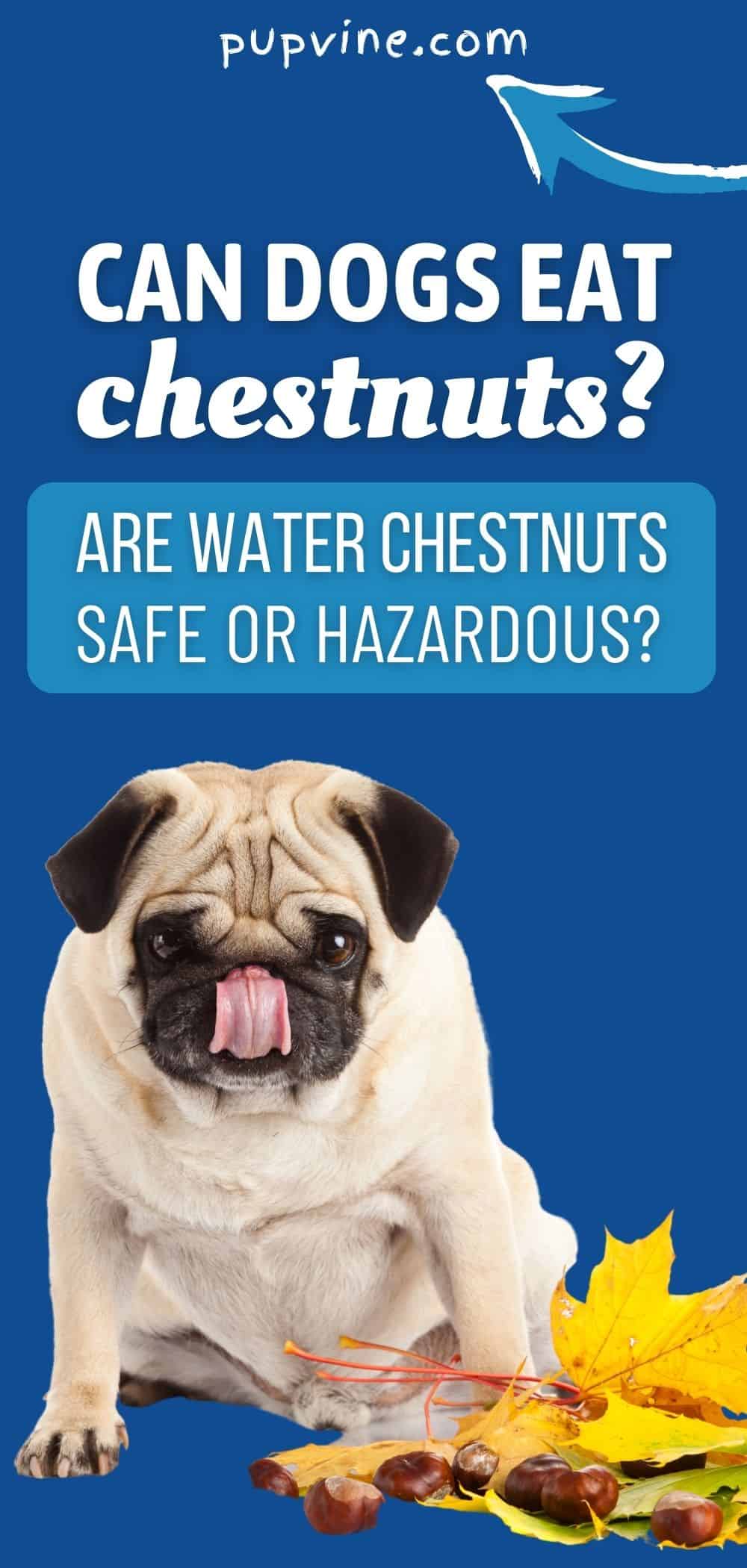As always, there’s a long and a short answer with questions of this nature.
The short answer is yes; dogs can eat chestnuts. However, the longer answer is much more complex, and it’s essential that you learn the whole truth before dishing up a bowlful for your pooch!
This is partly because there are different types of chestnut, so we must be clear about which we’re talking about.
Most dog owners love to treat their furry friends. We like to give them new experiences and let them try different foods, and they love us all the more for it. The thing is, what if it makes them sick?
The main worry of all dog lovers is that their perfect pooch will fall ill – or worse. The very thought is bad enough, but to know that you may be responsible because you fed them something harmful is unthinkable.
So, can dogs eat chestnuts? Let’s find out.
Are Chestnuts Bad For Dogs?
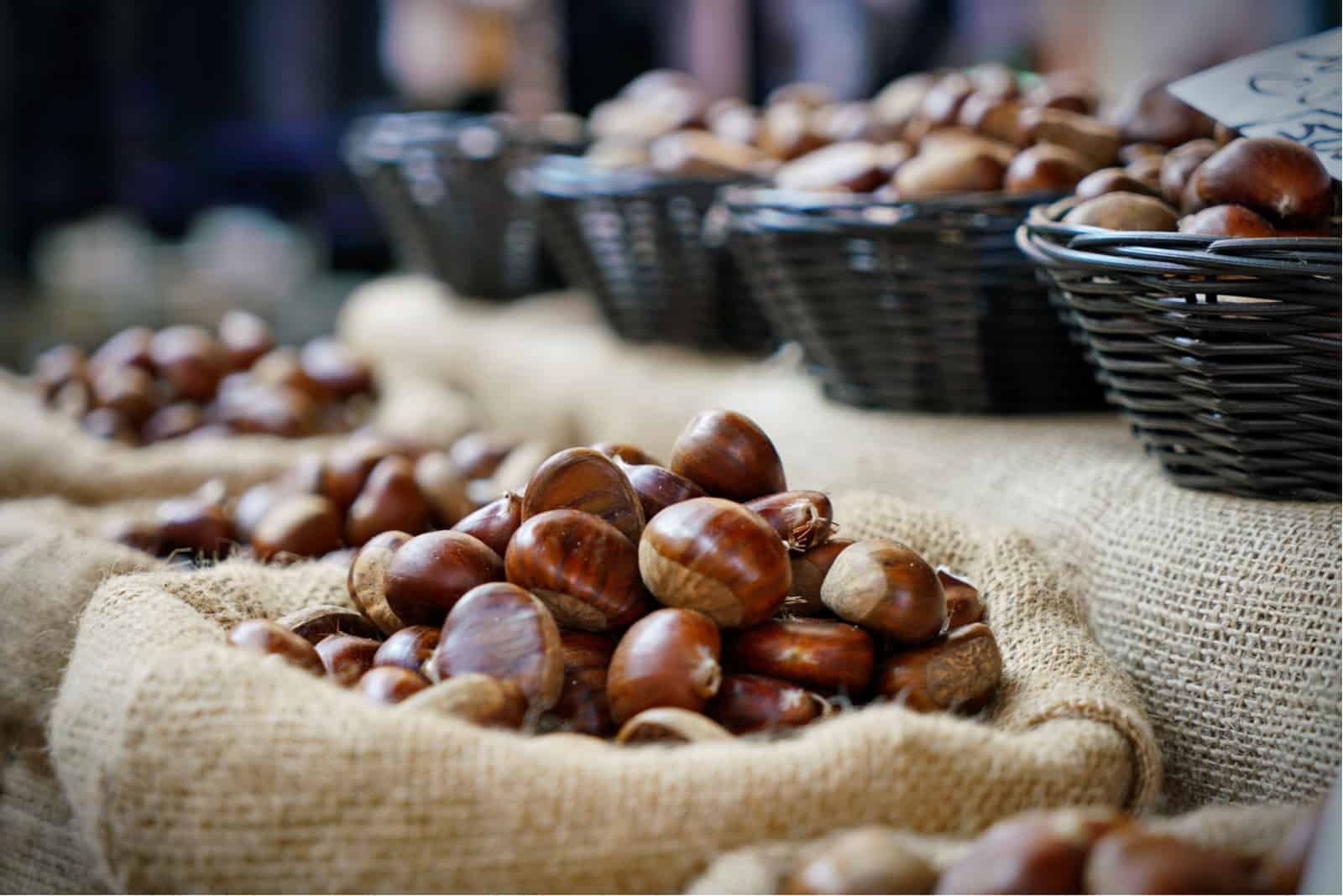
It all depends on which type of chestnut we’re talking about!
If it’s the edible nut produced by the seven species of deciduous Castanea trees, then they’re probably safe for dogs to eat.
For the most part, the nuts from these trees are mostly known as chestnuts, but they’re also called American chestnuts.
You can tell them apart from other types of nuts by their appearance: they are small, covered with tough, glossy, dark brown skin, and are flattened on one side. One end will form a point, while you’ll find a lighter-colored woody area at the other end.
This is where the nut (technically a fruit) was attached to the prickly husk with a bunch of other nuts. This husk splits as the nuts ripen, peeling back into four separate pieces and allowing the nuts to fall out.
Health Benefits Of Chestnuts
• This type of chestnut has many health benefits:
• They have high amounts of magnesium, essential for healthy nerve function, muscle, and bone.
• They’re high in omega-3 fatty acids, great for brain and heart function.
• They contain vitamin c (unusual in nuts!) and other antioxidants (such as gallic and ellagic acid) that help remove free radicals from the system, reducing the effects of aging, along with the risk of certain cancers. Cooking chestnuts enhances these rather than destroying them.
• Like bananas, they are very rich in the mineral potassium, which contributes to brain function, heart health, nerve impulses, muscle activity, and improving your health generally.
• They are packed with proteins that are broken down into essential amino acids.
• They are a high fiber food (3 grams of fiber in 100 grams of chestnuts), vital for your dog’s digestive system, and good for regulating blood sugar levels.
In addition, they contain vitamin B6, vitamin A, vitamin E, zinc, phosphorus, copper, iron, calcium, and manganese.
So, are chestnuts suitable for dogs? Surely with all that goodness packed inside, they must be?
Well, yes…BUT, you have to be careful!
Can Dogs Eat Raw Chestnuts?
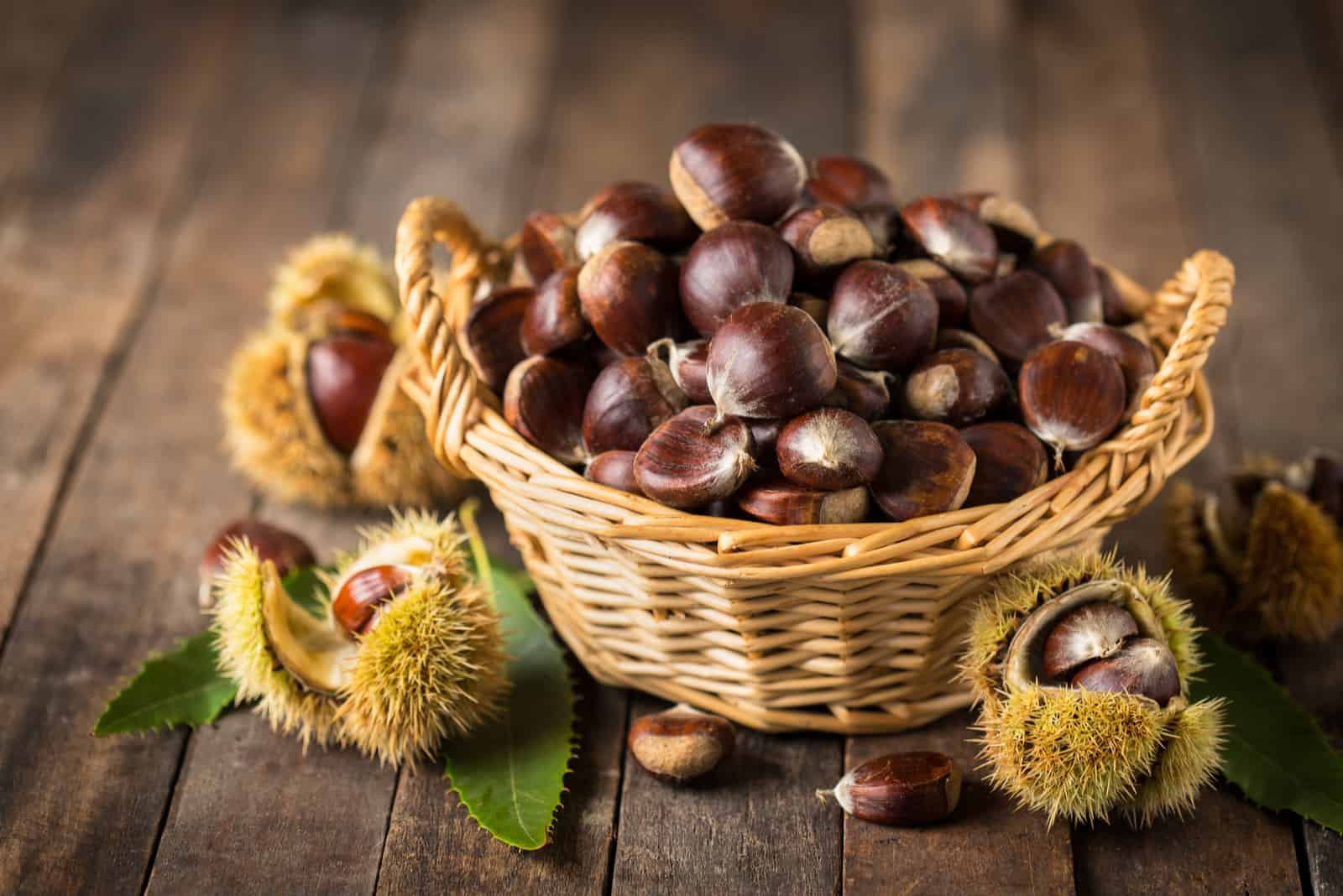
It isn’t good for dogs to eat raw chestnuts as they contain high amounts of tannic acid, which can be toxic to dogs. Tannic acid can damage the kidneys and liver, and if your dog already has problems in these organs, the result can be fatal.
Also, raw chestnuts are pretty tough to chew and digest and may present a choking hazard, so it’s best to cook them before giving them to your dog. Besides, they’re a lot easier to peel once cooked!
Speaking of which, never give unpeeled chestnuts to your dog, as they may choke on these too.
Can dogs eat chestnuts? Yes, but not raw!
Are Cooked Chestnuts Safe For Dogs?
As mentioned above, cooked chestnuts are better for your fuzzy friend than raw ones.
However, the cooking method affects how healthy they are!
Many people boil chestnuts before roasting them, making them easier to peel. Others only boil and eat them without roasting. You can also fry chestnuts in butter or oil, but that’s entirely your choice!
Even so, you need to think carefully about how you cook them if you plan to share them with your fur baby.
Boiled or roasted chestnuts are fine for your dog, but fried foods can harm your dog’s health. Fried and fatty foods cause inflammation of your dog’s pancreas, leading to pancreatitis.
Essentially, the pancreas produces enzymes that can severely damage your dog’s intestines. As a rule, it’s better to avoid feeding your dog anything fried!
Can dogs eat chestnuts? Yes, if they’re cooked, but not fried.
What About Prepared Chestnuts?
All of this assumes that you bought fresh whole chestnuts rather than those in a can or vacuum-sealed pack that have been peeled and cooked.
Before you give any to your dog, check the ingredients list to see what was added. It’s never wise to feed your dog anything containing high salt levels or any other seasonings like onion powder or garlic.
It’s always better to avoid anything with added salt, as dogs have a high risk of sodium ion poisoning. Symptoms will usually show within three hours of the dog consuming too much salt, including vomiting, increased urination, diarrhea, lethargy, and a lack of appetite.
Severe cases cause tremors and seizures, and the dog may fall into a coma, after which death is not uncommon.
Returning to our primary theme, can dogs eat chestnuts? we can say yes, but they should be cooked, must be fully peeled, and should be served plain with no seasoning. They should also only be given in small quantities and not too frequently.
Other Potential Risks Of Giving Dogs Chestnuts
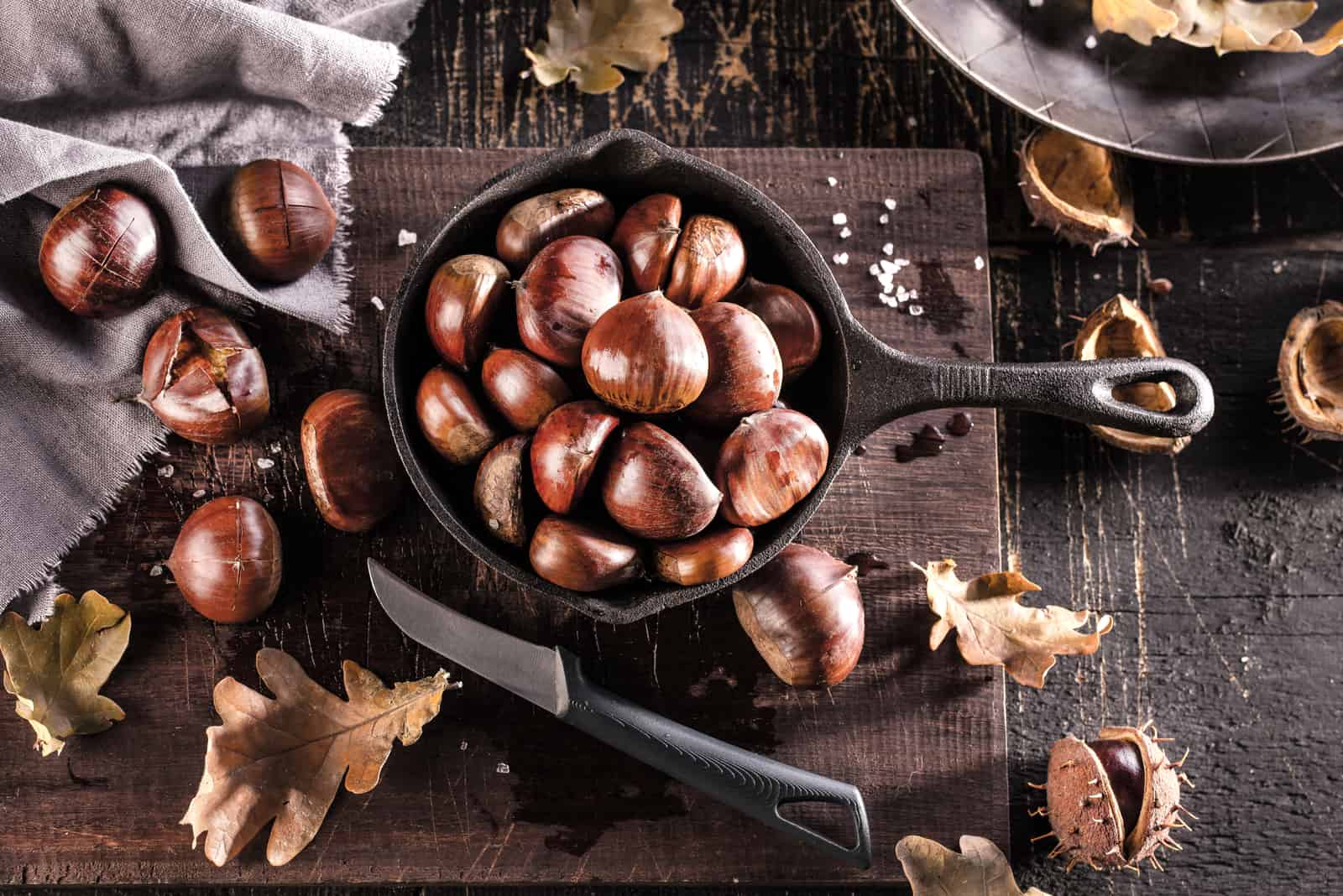
Like humans, dogs suffer from allergies and food intolerances, including nut allergies.
This includes pecans, macadamia nuts, almonds, walnuts, Brazil nuts, and pistachios. In fact, most of these contain toxins that are extremely harmful to dogs.
If you’re not sure whether your dog is allergic to nuts, only give them a tiny quantity of chestnuts to see if they have an allergic reaction.
Dogs react differently to humans when they get allergies or are intolerant to a specific food. Although they may sneeze, wheeze, and have a runny nose, they often develop a skin rash or hives.
While these symptoms are usually mild, severe cases can be life-threatening.
Chestnuts also contain a lot of starchy carbohydrates that are difficult for dogs to digest, possibly resulting in gastrointestinal problems like diarrhea and constipation.
It’s also important to completely remove the hard outer shell and the fibrous skin beneath before giving the chestnuts to your dog, as these inedible parts present a choking hazard.
Can Dogs Eat Sweet Chestnuts?
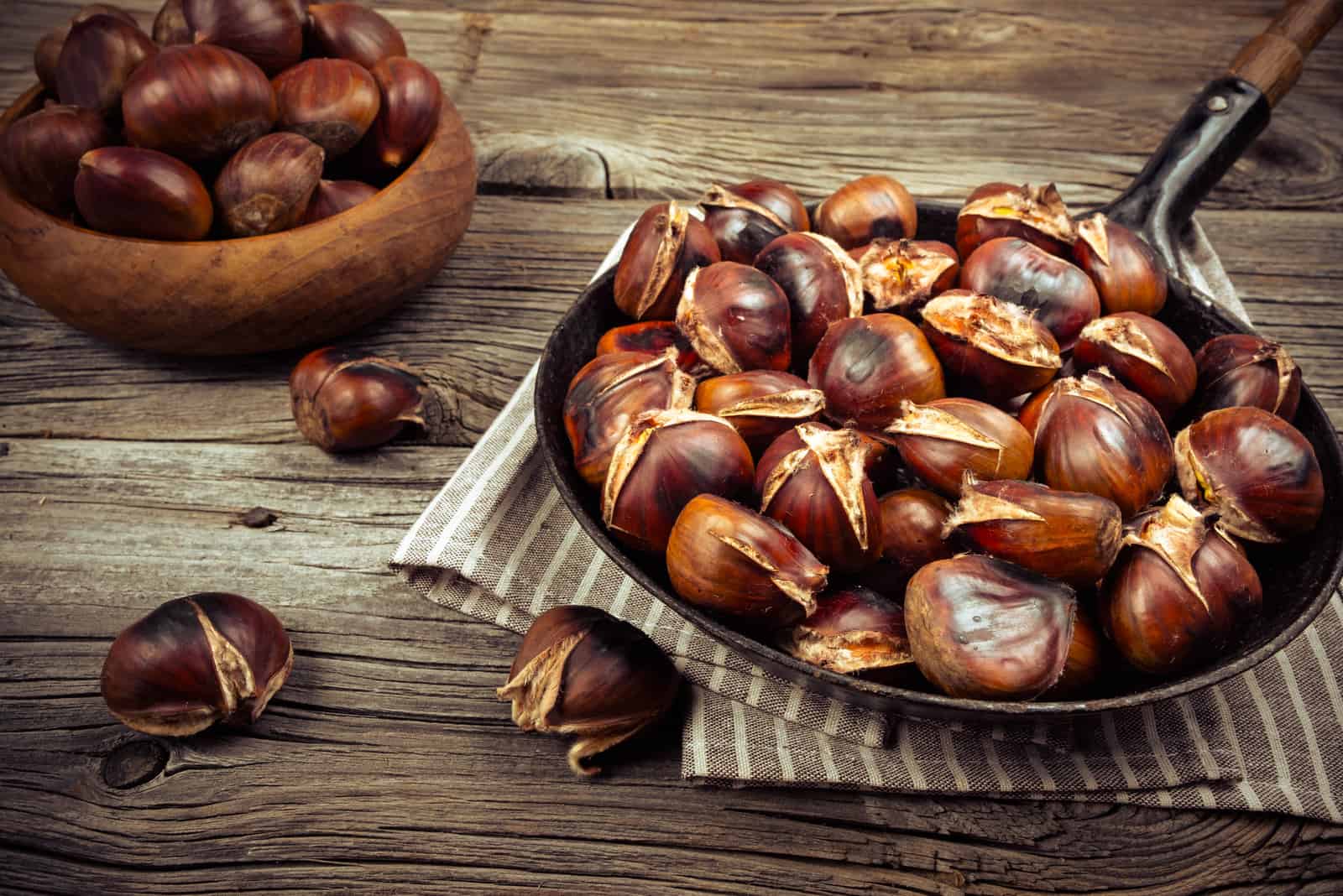
Sweet chestnuts are essentially identical to American chestnuts (or just plain old chestnuts!) but slightly smaller and sweeter. The larger version has a stronger flavor and is generally much easier to peel.
To many people, the names are interchangeable, but this really doesn’t matter that much.
• With this in mind, we can apply all that we’ve covered above:
• They’re safe for dogs as an occasional treat
• They shouldn’t be given raw
• You need to ensure that they are wholly peeled as dogs may choke on chestnut shells
• They should be chopped into small pieces
• Never add salt! Excess salt in your dog’s diet can easily lead to sodium ion poisoning.
• Roast or boiled is fine, but don’t fry them!
You can safely feed your dog sweet chestnuts as part of a healthy and balanced diet if you follow this advice.
Can Dogs Eat Horse Chestnuts?

This one is easy, as it’s a big NO.
Seriously, horse chestnuts are bad news for dogs, humans, and other animals as they contain high levels of a neurotoxin called aesculin.
Horse chestnuts are also known as buckeyes and conkers and are larger and rounder than American chestnuts or sweet chestnuts.
You’ll often find these shiny brown nuts on the ground between September and October, sometimes still encased in a spiky green shell.
It’s important to stress that humans do not eat these nuts. Although part of the chestnut family, they are not safe to eat. One or two won’t do any serious harm, although it will cause abdominal pain.
The same applies to dogs, so you need to take care when out walking in an area with horse chestnut trees. If your dog eats even one or two of these nuts, it may suffer from an upset stomach.
Naturally, the more they eat, the worse the symptoms, and in some cases, this can be fatal. Please note: there is no known antidote to aesculin poisoning. Aesculin damages nerve cells and is hemolytic, meaning that it breaks down red blood cells.
All you vet can do is make your pooch comfortable and treat the symptoms.
Gauging the actual effect of consuming horse chestnuts is difficult, as each tree produces different levels of toxicity, and some conkers will be far more toxic than others.
Generally speaking, it’s best to avoid letting your dog eat them at all.
Can dogs eat chestnuts? If they’re horse chestnuts, then definitely not.
Can Dogs Eat Roasted Chestnuts?
We mentioned this possibility earlier but let’s go over the facts again.
Roasted chestnuts are part of the Christmas and winter holiday season traditions for many people. Roasting these plump juicy treats brings out the nuttiness and flavor, which is why this is the preferred cooking method for most.
That’s great, as we’ve already learned how healthy chestnuts are, and they’re safe for our furry pals in small amounts.
However, it’s what we do to them once they’re cooked that makes all the difference.
Most of us will sprinkle a generous handful of salt over the top, balancing out the sweet and savory.
As we discovered earlier, too much salt in a dog’s diet is a recipe for trouble and may even cost them their life. Salt poisoning (or sodium ion poisoning) is a potential killer. If you want to feed your dog a few roasted chestnuts, pick out a few before scattering that salt!
Can Dogs Eat Water Chestnuts?
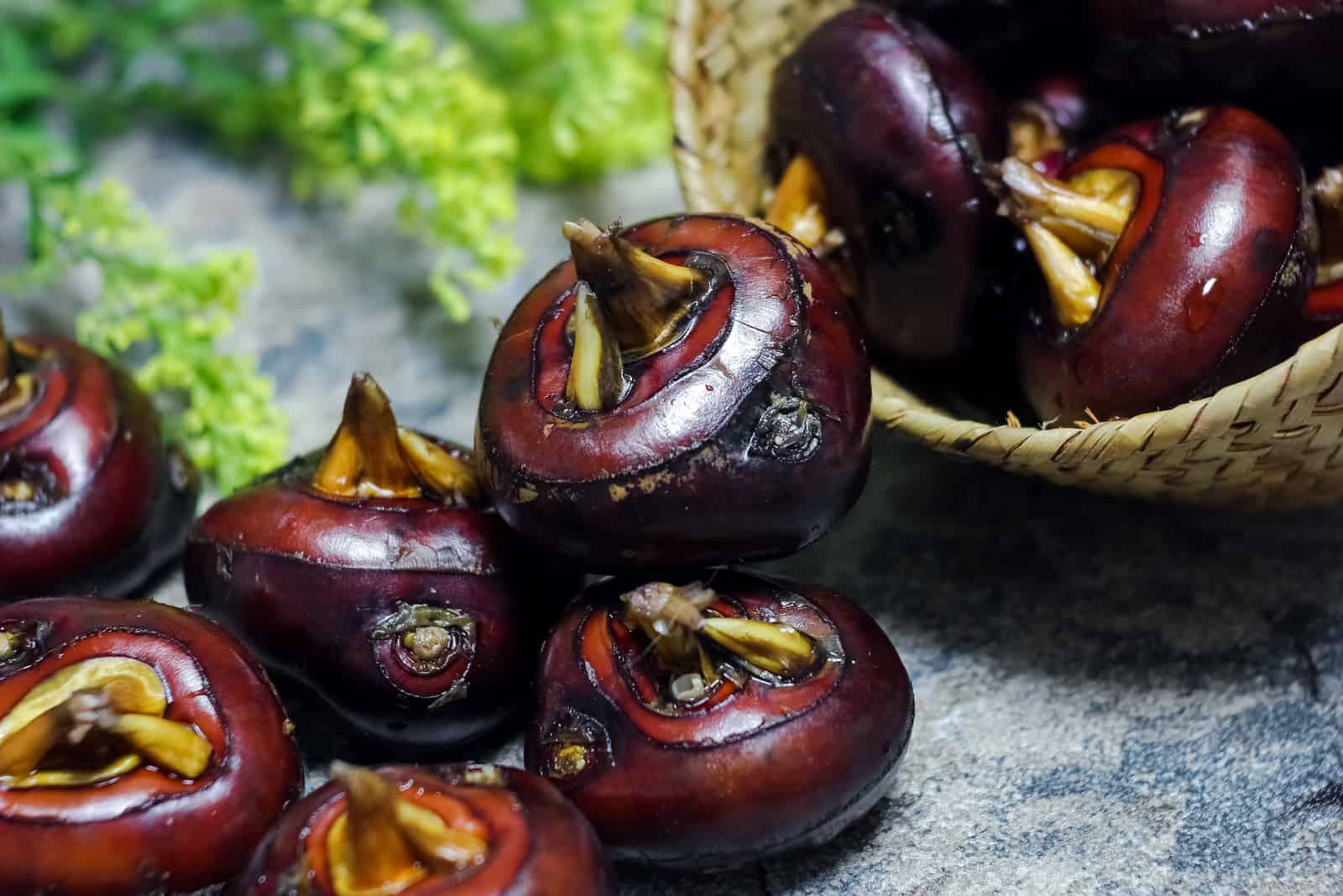
We had to include this one to clear up any confusion! It seems many people Google this question as they believe there’s a connection between chestnuts and water chestnuts.
The fact is, water chestnuts are not related to chestnuts (either the American or sweet varieties) in any way. They aren’t even nuts! So what exactly are they, and can you feed them to your dog?
Water chestnuts are a type of corm (the root, a bit like a bulb on a flower that sits below ground) of an aquatic Asian plant.
Although the whole plant is called the water chestnut, we only eat the corm, and that’s the bit that people recognize from the name. It has a unique crunchy texture, even when cooked, and some people describe it as being like a cross between coconut and apple.
Their sweet, nutty flavor is also unique, making them ideal for Chinese or Far Eastern cuisine.
So, we know what they are, but are they safe for dogs?
As with the other chestnuts, the answer is yes, but there are precautions you need to take.
Water chestnuts are available fresh or in cans, and it’s always best to use fresh if you can, as canned ones have added salt and other additives.
Although it’s considered safe for humans and dogs to eat raw water chestnuts, some experts have raised concerns about fluke worms. These parasites can be passed onto humans and dogs if the water chestnuts aren’t cooked.
Due to this risk, it’s wise to wash them thoroughly after peeling. The parasites don’t live inside the chestnut itself but in the skin you peel off.
You could also try blanching your water chestnuts: they’ll still be essentially raw, but you’ll kill any remaining parasites.
This problem aside, water chestnuts contain a lot of good stuff!
Here are a few to consider:
• They are a rich source of antioxidants, ferulic acid in particular. These help fight free radical particles that damage our cells and cause cancer, but they may also help reduce tumors and slow down cancer growth.
• They are low in calories (about 60 calories in a half cup), low fat, and high in fiber.
• They’re high in vitamin B6, potassium, riboflavin, manganese, and copper.
Potassium is particularly good for older dogs as it reduces the risk of heart problems, high blood pressure, and strokes.
So, in general, it’s okay to give your dog fresh water chestnuts, but don’t overdo it, or there’s a chance that they’ll get an upset stomach! The canned variety should be avoided as they contain too much sodium.
Also, it’s not a good idea to feed your dog pickled water chestnuts as most pickled foods tend to be packed with salt.
On the whole, dogs don’t enjoy the sharp flavor of pickles anyway (unless you happen to have one of those odd pooches that bucks the trend!).
There’s also a pretty good chance that the pickling vinegar will upset your dog’s stomach as they are sensitive to acetic acid. Small dogs and those with kidney problems will be particularly affected.
Finally, while treating your dog to a few of these crunchy treats is okay, don’t be tempted to include other morsels from your meal.
As water chestnuts are mainly used in Chinese cuisine, there’s a good chance it will be a stir fry that includes sauces, meats, salt, or other ingredients that aren’t good for your dog. And as we mentioned already, fried foods are bad for your dog’s health.
In Summary: Can Dogs Eat Chestnuts?
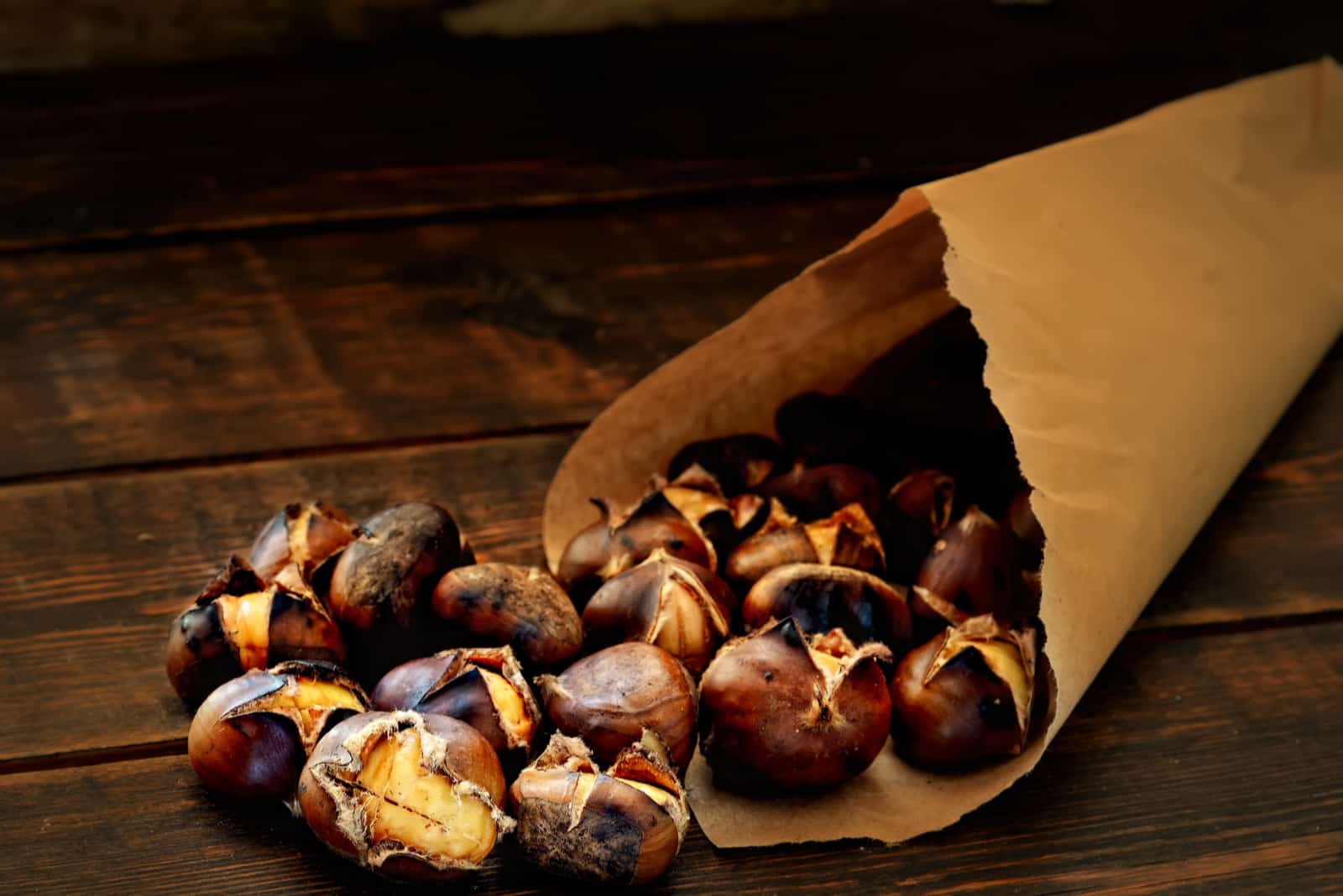
The main fact to remember is that there is no substitute for your furry friend’s regular dog food. This should form the basis of a balanced, healthy diet and anything else they get is a supplement to that.
Many different types of human food carry potential risks for dogs, especially highly-processed foods. Dogs have remarkably sensitive digestive systems and can’t process some of the ingredients we eat.
There’s also a wide variety of chemicals (natural and artificial) that can make them seriously ill, so dog owners must be vigilant at all times and double-check before feeding their pooch anything new or different.
As a responsible dog owner, that’s precisely what you’ve done by reading this article to discover the answer: Can dogs eat chestnuts?
Let’s recap what we found out:
• Dogs can eat the nut from the chestnut tree, known as the chestnut, American chestnut, or sweet chestnut.
• However, this should be an occasional treat, never a regular thing.
• Ensure the hard outer shell is removed and the tough, fibrous skin as these may catch in your dog’s throat.
• It’s better to cook the chestnuts as raw ones can be tough and difficult to digest.
• Don’t add any seasoning; dogs don’t care that much for it anyway, and it can be harmful to them.
• Boil or roast them, but never give your dog fried chestnuts (or any fried food!).
• Chop up the chestnuts, as dogs may swallow them whole, which could be a choking hazard and may also cause intestinal blockage.
• Remember, although they’re a healthy food, they are rich in starchy carbs that can be difficult for your dogs to digest. Your dog’s regular food will already contain starch, so adding to it may cause problems like obesity and insulin resistance.
• Never let your dog eat horse chestnuts! They contain aesculin, a neurotoxin that will make your dog sick. Although fatalities from this are rare, it’s never worth taking the risk.
• Water chestnuts are fine for your dog, provided you follow a few simple rules.
So, there you have it! We’ve covered the subject pretty well, and now, hopefully, you have a better idea of the risks and benefits of feeding your dog chestnuts.
While it’s only natural to want to treat our furry companions, it’s always best to check before giving them new foods, especially some of the things we eat.
Although dogs are considered omnivores, they really can’t cope with some foods. The list of so-called human foods they can’t eat is as long as your arm! It’s always best to be cautious before going ahead.
Always introduce new foods gradually and in small quantities, watching for any adverse effects. If your dog eats something you think it shouldn’t have, contact your vet immediately.
It can take anything from one or two hours up to two days for a reaction to show, so never assume all is well just because your dog seems okay twenty-four hours later.
If you decide against giving your pooch chestnuts (or they have a bad reaction), don’t despair, as there are plenty of other natural, healthy treats you can use, like apples, carrots, broccoli, green beans, bananas, and cooked sweet potatoes.
All dog lovers want the very best for their dogs, and we love to spoil our pooches. Even so, the last thing we want to do is to cause them any harm or contribute to obesity and disease.
Articles like this one can offer guidance, but in the end, it’s your choice and your responsibility. Your dog doesn’t have a choice, but you do. And that’s why you should always choose wisely!
